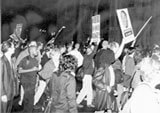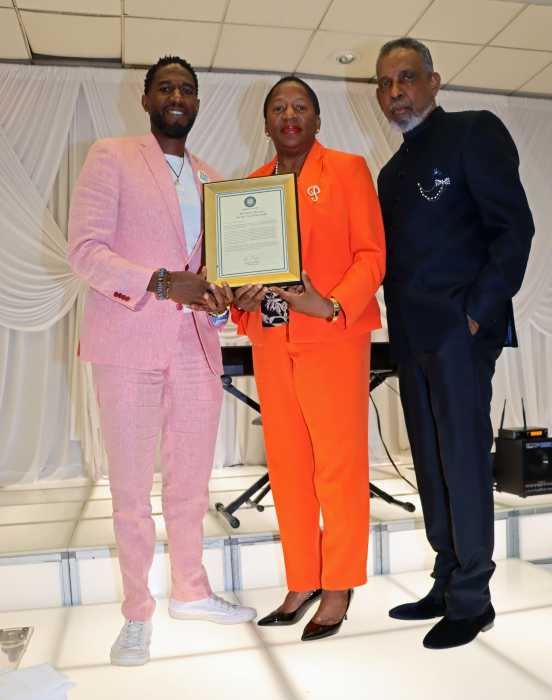Federal Court denies claims against city over arrest, incarceration of participantsNews Briefs
One week after Shepard died, activists in New York’s gay community called for a march on October 19, starting at 59th Street near the Plaza Hotel and terminating further down Fifth Avenue at Madison Square Park at a candlelight vigil. The organizers expected 200 people, but an estimated 5,000 people showed up, and more people joined the march as it proceeded down the street.
Those arrested were handcuffed and held in buses, some overnight. Police did not issue any desk appearance tickets—a procedure in which the arrestee is quickly released with a written notice to appear at a later time—pursuant to a decision by then Chief of Department Louis Anemone, the senior ranking officer on the scene. In a later deposition, Anemone stated that his decision was the fact that he did not want to tie up police officers with paperwork writing up large numbers of desk appearance tickets as well as his concern that the event, which the police called a “demonstration,” had turned confrontational and that those released might just go right back to fuel the mayhem.
Alleged police misconduct during the march spawned roughly 20 complaints to the Civilian Complaint Review Board and three lawsuits. Three injured marchers won $548,000 in a lawsuit against the city in 2001 and four others won $60,000 in a separate suit in 2002.
The seven arrestees—Timothy Bryant, Maurice Cassidy, Joseph Defilippis, Jessica Dyson, Leonard Gay, Robert Takacs, and Ulrik Trojaborg—who disputed the legality of their arrests in this federal lawsuit argued the police should not have detained them on the buses for long periods of time in handcuffs. Their suit claims that the city is liable for violations of their civil rights and also their rights against false arrest, false imprisonment, and malicious prosecution under state law. The criminal complaints against the seven had been dismissed or the arrests voided, in some cases with police officers conceding that the arrestees had not misbehaved.
In this type of case, a plaintiff must show that some constitutionally protected right has been violated pursuant to a city policy. The plaintiffs argued that under police regulations, they were entitled to be issued such tickets and quickly let go, rather than being held in handcuffs for many hours and that Amemone’s blanket decision against issuing any desk app-earance tickets violated their rights to due process of law. The plaintiffs emphasized that each of them was entitled to an individual determination on the issuance of a ticket. They argued that the police were being vindictive because the vigil was memorializing a slain gay student and protesting against anti-gay violence and thus violated their First Amendment rights to engage in political speech.
In rejecting all these arguments, McKenna found that whatever errors the police might have made, their procedures did not rise to the level of constitutional violations sufficient to impose liability on the city. Although the individual plaintiffs’ situations may appear to qualify for desk appearance tickets, McKenna noted that the regulations say that the police “may” issue such a ticket, thus giving them discretion and that generally courts will not impose liability for the refusal to exercise such discretion.
McKenna accepted the city’s argument that the purpose for the desk appearance ticket procedure was “a discretionary procedure designed to ease the burden on the court and the corrections system” and found no “right” for individuals to receive desk appearance tickets rather than being held in custody.
Also, in order to show a constitutional violation, the plaintiffs needed to prove that the refusal of desk appearance tickets to them was in some sense “arbitrary,” which McKenna found they had not.
“It cannot be said, without more, when an event leads to the arrest of 115 people, that a decision not to issue desk appearance tickets violates the Plaintiffs’ substantive due process rights,” the judge wrote. “It is not ‘arbitrary or conscience-shocking in the constitutional sense.’”
McKenna also discredited the plaintiffs’ First Amendment retaliation arguments, finding little support for the idea that the police were responding to the subject matter of this particular march, or that as a matter of policy they automatically refrain from issuing desk appearance tickets at political demonstrations, as opposed to other kinds of events. There was evidence that desk appearance tickets had been issued at other public demonstrations in the city, and that the reasons for Anemone’s decision in this case were based mainly on the police being able to maintain control of the streets.
Having found that the city was entitled to judgment on all the federal claims, McKenna decided not to deal with the state law claims, which he is entitled to do, since federal court jurisdiction over such claims is entirely discretionary. The plaintiffs can try to pursue those claims against the city in state court.
McKenna pointed out that all of the discovery documents and depositions generated over the five years that this case was being litigated can be used in a state lawsuit, responding to concerns that given the passage of time, some of the witnesses are not available to testify in a new lawsuit. The plaintiffs also have the option, of course, of appealing McKenna’s decision to the U.S. Court of Appeals.
Gay City News PHOTO
We also publish:




































